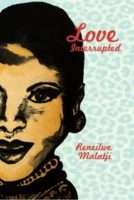We marched out the same way we came in, without a word or a whinge. Kgaugelo and Maseapo remained seated for a while longer, craving a bit of drama, but eventually gave up when there was no reaction. When they too finally got up to leave, the skinny lady came to them and asked, with a satisfied smirk on her face, “Is there something wrong?” They just looked at her and marched out silently. As they left, an elderly grey-haired man stood up from one of the tables near the entrance and opened the door for them.
“What if the situation is worse at the hotel?” said my friend Mpho, who had come all the way from Limpopo Province for my graduation, as we climbed back into the Kombi.
“We’ll have to cross that river with or without a bridge,” said my mother.
Despite the restaurant incident, the mood was jovial in our hired minibus. My son, who was in the front passenger seat, kept extending his arm behind him, the way taxi drivers do when they’re demanding their fare.
“A e tle ka disiti. Bring the money seat by seat with the change sorted,” said my son, imitating the harsh tone of most South African township taxi drivers. The others laughed.
“Hey! Wena, taxi driver, slow down man. Our children are still young. We don’t want to die in an accident,” Mpho imitated a disgruntled taxi passenger.
“Hey mama! If you want to be in control, go buy yourself a car. This taxi is mine. I will drive it the way I want,” Tebogo said.
Everyone said something that reminded us of how it was to travel in a township taxi. We did not feel the twenty-kay stretch to the hotel at all. Everyone was laughing all the way. I chuckled until my stomach hurt.
The topic then went back to what happened at Link-Up restaurant.
“I knew something wasn’t right when I saw the name of the restaurant. Link-Up is a chemist, not a restaurant. It’s not a good name for a place where people eat. Probably their food wouldn’t have been nice. This whole thing must be God’s way of saving our taste buds from a disgusting experience,” said my mother. Everyone laughed.
“Mma, the chemist is Link, not Link-Up,” said my son.
“You denied me and Maseapo the opportunity to show you our ability to make white people vanish. If we’d stayed a little bit longer, you would have seen us in action,” said Kgaugelo.
“Yaa! They need to vanish back to Europe or, better, into the sea,” said my mother.
“No, Mma! Not all of them are bad,” said my son. “I have many friends at school who are white and good. When you talk like that you are now behaving like the Link-Up woman.”
“Don’t remind me of that racist. Mxe! That thin, cocky psychopath! She belongs in the ocean with sharks.” After this outburst, all kinds of racist anecdotes came out. My friend Mpho told us about an incident in a Johannesburg restaurant. A white waiter wrote “darkies” on an order slip instead of the table number. This was the only table occupied by blacks in the restaurant. The waiter then accidentally gave the customers the order slip instead of their bill. When they saw this, all hell broke loose, and the customers proceeded to sue the restaurant for discrimination.
I’d also experienced my share of racism. Earlier that same week a white cashier at a bookstore stopped processing my payment for the books I’d purchased and went to help two white ladies who had just come in. I shouted after her, demanding that she return to finish my transaction. I think I saw a trace of remorse in her eyes after that, but I might have been imagining it. I decided not to mention my incident as now everyone was competing to tell their own stories.
“Let me tell you what happened to me earlier this week at the Game store parking lot in Polokwane,” said my mother.
My mother was about to park her car when an Opel Astra simultaneously moved into the space next to hers. The Astra parked very close to the left border of the parking space, leaving little room for my mother. When she opened her door, it lightly clipped the Astra. She then pulled it back and negotiated her “big mamma” body out of the car. The man who was driving the Astra did not make any effort to reverse and park appropriately. But my mother was in too good a mood to make an issue of it.
The lady in the passenger seat was a slender, elderly white woman. She was able to slide out her small figure effortlessly. Her door did not touch my mother’s Mercedes. My mother examined the area where her door had brushed against the Astra, to make sure there was no dent or a mark.
She then felt the need be kind, and apologised. “I am sorry to have touched your car,” my mother said politely.
“Yes, you should be sorry. People like you don’t belong in a car. You should be jumping up and down in trees,” said the white woman crossing the street with the old man. They disappeared into Game.


